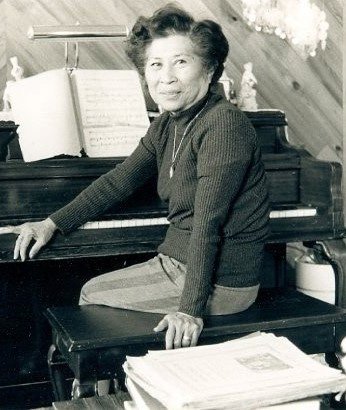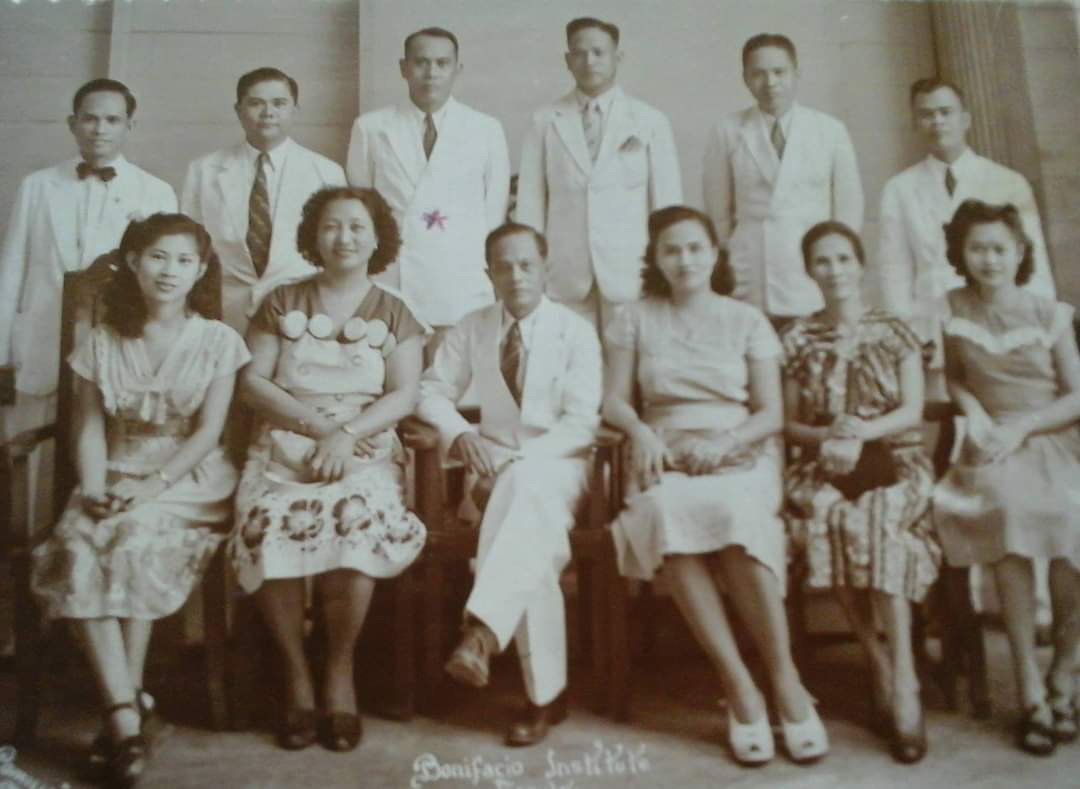Estrella Macute Echavez – A Filipina of Many Gifts (1920-1999)
/Estrella Macute Echavez, 1993, Florida
She was a sickly child growing up. Her parents were fully aware of her delicate health and gave their full attention. She was an “A” student and graduated valedictorian of her high school, which allowed her to enroll tuition-free at Silliman University at age 17. Estrella was a pioneer in her endeavors. When she switched her major from pre-med to education, she was the first math major and only female for several years studying for a teaching degree. While at school, Estrella suffered from pernicious anemia and required medical care from her uncle, Dr. Santiago Calo, who was married to her mother’s sister, Maria de la Paz Macute.
Estrella was in demand at church and social gatherings because she could play any piece on piano by ear and first sight. She had always had a good ear for music from age five. Her mother was her piano teacher. It was during her time at SU that she taught herself to play the organ as she was the accompanist for many church services. Sunday evenings she often played for Christian Endeavor, a youth group in the town church, and Sunday mornings was spent playing for worship service on campus.
In January 1942, her senior was interrupted by the invasion of the Japanese. She was forced to leave campus and flee with the Calos and other families to Palinpinion, where Americans, a few faculty members and students who could not go home assembled to evacuate to the mountains. At this time, all the coastal towns were under Japanese control.
About the same time, the Japanese also invaded Dipolog City in northern Mindanao where they confiscated the Echavez family home, and the family escaped to the jungle where they remained until the Battle of Mindanao. Estrella eventually returned to Dipolog where she remained and would organize the underground resistance against the Japanese.
In January and February 1945, the underground resistance seized the Dipolog airstrip while surrounded by the Japanese. When the American troops started landing in the Philippines, she organized the USO in Dipolog City, where troops were flown from Australia to build landing strips before the big invasion in Leyte. She and ladies from the leading families of Dipolog City organized social and church activities for the troops. This boosted morale and lessened home sickness for the GIs. Marine pilots flew out of Dipolog to carry out bombing in Zamboanga City 150 miles away.
On March 8, 1945, two reinforced companies of the 21st Infantry, 24th Division flew into Dipolog to reinforce the defense of the airfield initially and then to provide blocking forces in the north for the invasion force that landed at Zamboanga City on March 10. It was in that same month that Estrella married lieutenant Alvin Reyes Gubisch, who was introduced to her by Dr. Calo. Alvin and Santiago were stationed in the same headquarters unit in support of the Battle of Mindanao.
Estrella and Alvin’s first child, Patrick Salaver, was born December 1945. Alvin and Estrella would also have three daughters: Dorothy was born in 1947; Edna (now Vidda) in 1948. Both born in the Town of Dipolog. After Edna was born, Estrella returned to Silliman University to complete her education and graduated Magna cum laude with a B.S. degree in Mathematics and English. She would become a teacher at the Bonifacio Institute in Dipolog and later at the West Negros College in Bacolod, Negros Occidental, Philippines.
Estrella Macute Echavez, far left, first row. Instructors at Bonifacio Institute, Dipolog, 1949
While Estrella was away teaching, Pat, Dorothy and Edna would be raised by Isabelo and Manuela in the Echavez home. In 1951, Alvin was transferred to Agana, Guam, to serve as a mechanic for naval operations. Their fourth child, Vinella, was born in Agana, Guam in 1952. In August 1953, the family was allowed to immigrate to the US as part of the Luce-Cellar Act of 1946, which provided a quota of 100 Filipino immigrants to US per year. The act was signed into law by President Harry S. Truman on July 2, 1946, two days before the Philippines became independent with the signing of the Treaty of Manila on July 4, 1946.
Because of the imminent independence of the Philippines, Filipinos would have been barred from immigrating without the Act. Due to Alvin’s Post-Traumatic Stress Disorder, which came about during the war, he became an alcoholic and the family suffered. The family had been poor and destitute since they left the Philippines. In August 1953, the family settled with Alvin’s sister, Elsie Gubisch Bansuelo, in the Presidio area of San Francisco. The following year with family discord increasing, Alvin moved to Vallejo, California, where he worked as an auto mechanic. The now single mother with her four children were so poor that they did not even have a bed to sleep on. The hotel where they stayed was one of several brothels in Chinatown with the residents taking turns taking care of the children while Estrella found work. Estrella met Paul and Pilar Laput who, upon hearing of the family’s plight, provided the family with the only mattress on which they would all sleep.
Estrella Macute Echavez with children Dorothy, Edna, Vinella and Patrick, 1954, San Francisco
Estrella got her first job as a secretary for the Northern California-Northern Nevada Council of Churches. With her new income, the family could move to live with Alvin’s brother, Walter Reyes Gubisch. He was a merchant seaman and away often so it was very convenient for the family to live in his apartment on Mason Street. It was Walter, who had lived next to the Laputs, who informed them of the family’s situation, which led to a relationship between Estrella and the Laputs that lasts to this day among the children and grandchildren.
In 1955, once Estrella was able to make it on her own, she moved to Manchester St. in San Francisco. She lived in Apartment 4. There, she met Canuto Alag Salaver, a manong who migrated to the US in 1927. He moved into Apartment 1. They married in June 1956. Their first child, Luna Salaver, was born November 1956. Two sons came later; Timothy Echavez Salaver, born December 1961, and David Benjamin Salaver, born May 1963.
Estrella Macute Echavez, circa late 1950's, San Francisco
Over the years, the hardworking Estrella not only held a full-time job, but also served as the church organist and choir director and taught piano on weekends. She was likely the first Filipina organist in the United States when in 1957, she joined Pedro Liban, music director, at Wesley Methodist Church (aka Filipino Methodist Church) to accompany the all-Filipino choir. In 1958, she became the music director and led music activities of the Filipino singers and the choir in performances throughout San Francisco.
During tax time, she leased an office and did other people’s taxes. There were times she would be organist for two to three different churches, going from one church service to another every Sunday. She was active in the San Francisco Council of Churches where she was elected thrice to three-year terms. She developed connections with the City and State through her founding and leadership of the Philippine-American Cultural Foundation, which produced Filipino cultural festivals and events throughout the City, including the International Dance Festival. In the ‘70s and ‘80s, she devoted herself to weekly Bible studies and played organ and piano for San Francisco and Los Angeles churches.
Estrella is remembered for her many efforts to improve the lives of those in the Filipino American community, including getting the first grant in San Francisco to work with the Filipino aging community in the South of Market (SOMA) in the 1960s. She was very active in the St. Patrick’s Community Center, helping disadvantaged Filipinos. In the summer of 1968, The Philippine-American Collegiate Endeavor (PACE) founded by Patrick received an inner-city council grant to provide tutoring support to Filipinos in the Bernal Heights district. Estrella used her connections in the community to secure the grant.
PACE occupied the second floor of a two -story building on Cortland Avenue and the first floor was occupied by the Bernal Heights Neighborhood Association. Student leaders held PACE meetings and tutored neighborhood children seeking to attend college, especially SF State. She also worked with then State Congressman Willie Brown to pass legislation that allowed foreign certified dentists and medical doctors to practice in California. In 1969, as a member of the San Francisco Council of Churches, she was a appointed to an SF Police Department task force to reduce gun violence.
In March 1970, she was the first Filipina honored in the United States for her community service when Senator Milton Marks of the California State Senate recognized her volunteerism on behalf of not just the Filipinos, but also others in the Asian-American community. Estrella worked tirelessly for minorities in San Francisco -- From gang members to medical professionals -- to achieve a better life.
Estrella Macute Echavez with sister Virgilia Macute Echavez Estacio, Dipolog, 1972
After she retired from the US Postal Service in the mid ‘80s, she earned a degree in Theology and founded her own church, Chapel of the Way, eventually settling in Florida, allowing her the time to travel not only to the Holy Land, but also throughout the US to spread the Word of God as guest lecturer. It was also at this time that she also became a Police Chaplain in Brevard County, Florida. Estrella died surrounded by her family in Las Vegas, Nevada on August 23, 1999, after a short bout with cancer.
My mother has greatly influenced my life as a singer, music director, concert producer, events organizer and writer. She will be honored with a series of concerts for Organ and Music on June 24 and 25 in Pleasanton and San Francisco.
Family photo taken at wedding of Max Garcia and Vinella Gubisch, 1995, San Ramon. Presided over by Pastor Estrella Macute Echavez.
Timothy Echavez Salaver is the son of a bad ass mother who fought for and promoted Filipino independence, self-determination, social justice and equity. He follows in her footsteps as a performing artist, writer, and music director.
Areté Singers presents Music for Organ and Choir by Gabriel Fauré, Francis Poulenc, Maurice Duruflé, Camille Saint-Saens and J.S. Bach including the West Coast Premiere of Luke Mayernik’s Missa de Octava with Luke Mayernik, Organist, and featuring Conductors Timothy Echavez Salaver, Leandra Ramm, Irene Cheng, Jennifer Liu, and Mary Jo Malabuyo.
PERFORMANCE SCHEDULE:
June 24
Trinity Concert Series
Trinity Lutheran Church
1225 Hopyard Road, Pleasanton
6:30 pm Pre-concert talk - Estrella Echavez, the first Filipina organist in the United States (1920-1999)
7:00 pm Concert Start
8:30 pm Concert End
June 25
Big Music Sunday
First Unitarian Universalist Society of San Francisco
1187 Franklin St., SF, 94109
11:00 am Concert Start
12:00 pm Concert End
Musical Meditations Concert (in support of their music program)
Cathedral of Saint Mary of the Assumption
1111 Gough St., San Francisco
4:00 pm Concert Start
5:00 pm Concert End









